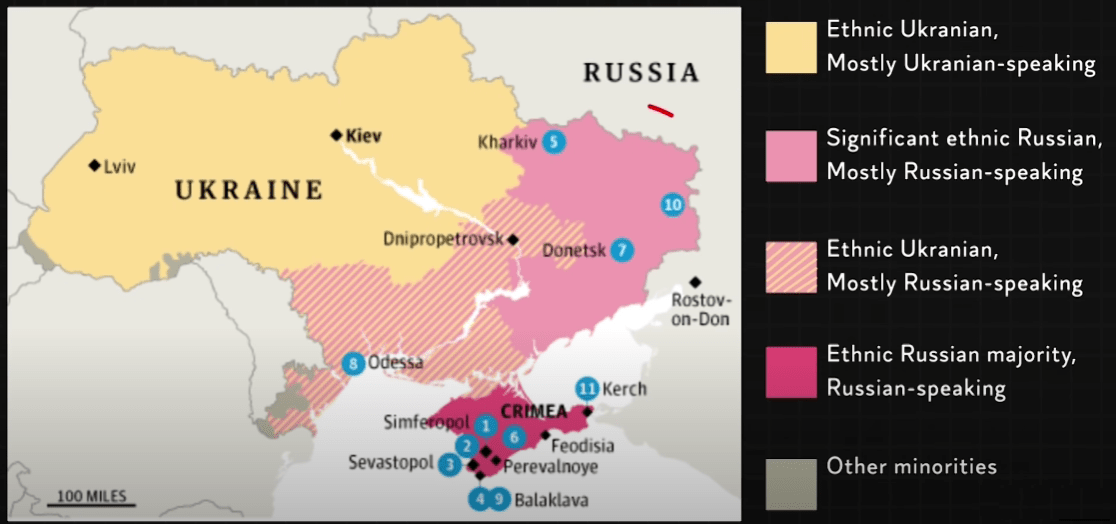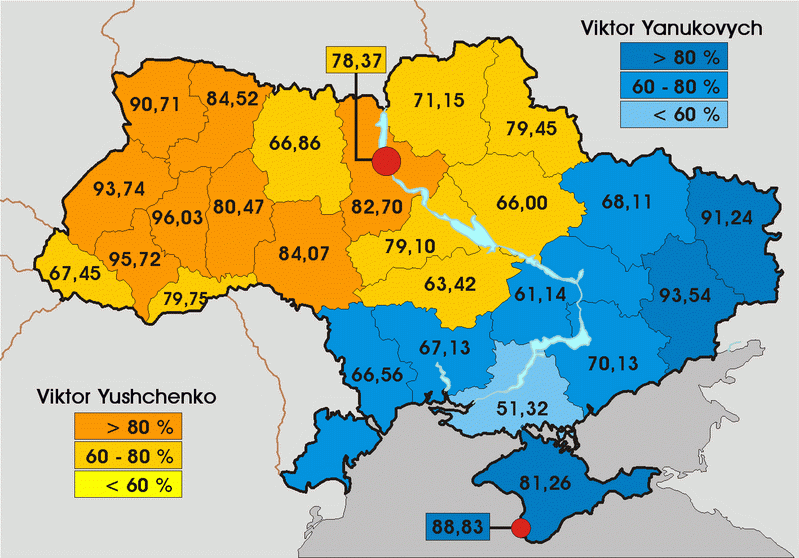I really didn’t think it would come to this—and it shouldn’t have. That war has come is a testament to the bankruptcy of our foreign policy establishment, and probably of its control by globalist ideologues seeking to impose their governance on the entire world. Obviously I can’t stay up to date on developments and write at the same time. However, here are two useful links to articles at Zerohedge that provide useful context.
First, the early state of the war and Russian goals. It appears at this point that the Russian attack is relatively narrowly focused on military targets. I say that because so far there are no reports of power grid outages or pipeline disruptions. In other words, this isn’t total war.
This article describes early reporting—with a bit of video footage—which is obviously incomplete:
Putin's "Shock & Awe" War On Ukraine Unfolds In "Dark Day For Europe"
“Dark Day For Europe” is exactly right—and a huge failure for US foreign policy.
In addition, however, the article quotes Putin’s spokesman describing Russian goals:
Kremlin spokesman Dmitry Peskov on Thursday issued comment on the scope and goal of the military objections, citing Putin's aim of the "demilitarization and denazification" of Ukraine.
"Ideally, Ukraine should be liberated, cleansed of Nazis, of pro-Nazi people and ideology," Peskov said, saying that operations would end only once these objectives have been reached. It remains unclear whether this will mean regime change in Kiev, though at this point that scenario is looking more than likely. There were early reports that President Zelensky has been offered safe passage if he leaves Ukraine.
Russia is also proclaiming “safe passage” for any Ukrainian military personnel who lay down their weapons.
The code word “denazification” seems to me to be a fairly clear intent of regime change as being a fundamental aim, at this point. More on that below.
The second article explains a major part of the US miscalculation. I say that despite the obvious need of the Zhou regime for a foreign excuse to cover for domestic disasters. There’s simply no way that the French and Germans are happy with war breaking out. Even front line NATO members and US “allies” like Poland are probably pretty unhappy with this development—all these countries would have preferred to avoid it and probably had clear strategies for doing so. In their eyes this has to be a huge US failure:
McMaken: Russian 'Weakness' & The Russian "Threat" To The West
The first part of this article explains Russian “Weakness”—in economic and demographic terms. Putin has brought Russia back a long way, but repairing the ravages of Communism is far from easy or complete. From that perspective, Russia is simply not a threat to the West, and that is reflected in Russian military spending. Now, it’s obviously possible to misrepresent true military capability by using simple dollar figures. Nevertheless, those figures do mean something, and they show that Russian military spending is a tiny fraction of NATO spending—probably more comparable to the spending of any single EU NATO country. That level of Russia spending, however, is necessarily a drag on the Russian economy in other respects—except, perhaps, arms exports:
Military Spending
So, given all these limitations, just how much is the Russian regime spending on military capability? Unsurprisingly, it is far, far behind the US in total spending. Russia spent approximately $66 billion on military capability in 2020, compared to $766 billion for the United States. Germany, France, and the UK combined spent more than $150 billion.
In terms of spending as a percentage of GDP, however, the Russian regime spent more than even the US. Russia's military spending in 2020 equaled 4.3 percent of its GDP, while US spending totaled 3.7 percent. Western European regimes, on the other hand, long accustomed to letting American taxpayers flood NATO members with military welfare spending, tend to spend well below three percent in military spending.
The concluding question posed by the article is central—or should be—to policy formulation with regard to Russia: Why Russia Matters, Even if it's not a First-Rate Power.
The core failure for US policy has been to, essentially, back Russia into a corner. In that position, given the geographical, energy, and military realities of the situation, Russia has considerable leverage. This is leverage it didn’t want to use, but which it feels forced to use:
At this point the reader may be asking himself, "if Russia is so weak, then it will surely be extremely easy to confront Russia in Ukraine and be done with it."
This, however—even in spite of Russia's many economic and demographic shortcomings—is not the case.
This is because there is an enormous asymmetry between how the West views Ukraine and how Russia views Ukraine.
In the US—and through most of the West in general—only the most committed hawks view Ukraine as an area of vital interest. In the US, for example, it is difficult to find a political constituency that believes Ukraine is worth the blood of American troops and the costs of a real war in general. The Russians view Ukraine as a matter of absolutely vital interest, much like the US views Mexico—and much like the US viewed Cuba during the Cuban Missile Crisis. If Ukraine is taken over by anti-Russian forces, this could be seen in a Moscow something very much worth a costly war.
When it comes to Ukraine, the Russian regime could be willing to endure very high costs that the West is not politically prepared to endure. Moscow might be willing to cut deeply into that "disposable surplus" that is necessary for warmaking. If the history of Russia proves nothing over the past 200 years, it's that the Russian regime is willing to expose its population to extreme deprivation in pursuit of protecting what the regime sees as vital interests.
…
Russia's actions in Ukraine are not the actions of a strong state with the capability of extending its power over vast new frontiers. Rather, the Ukraine situation is the result of the West's refusal to take seriously Moscow's concerns over extending NATO closer to the Russian heartland. The West's repeated dismissal of Russian concerns has forced the relatively weak Russian state to take greater risks.
This is what is now at work in eastern Ukraine. But none of this means Russia is a great power in the same league with the US, or even with Western Europe.
Now, for the social realities on the ground in Ukraine, which will inevitably shape Russian policy. No doubt Russia has considered these factors, but as the situation unfolds Russian decisions may vary, affected by those factors.
I mentioned “social” factors, but the those social realities are rooted in centuries of history. I’ll use a series of maps to illustrate the complexities of Ukraine’s socio-political reality.
The first map, which imposes historical boundaries over an electoral map of Ukraine illustrates a key point: Those parts of Ukraine that are most committed to Ukrainian identity and Ukrainian independence were, for centuries, part of the Polish - Lithuanian commonwealth. Note especially, that the most rabidly anti-Russian parts were actually—but very unhappily—part of Poland until WW2. These are the areas of Nazi collaboration, and where current Nazi style ideology is still strong. It is to these areas that Putin is referring when he speaks of “denazification”, and this is not pure rhetoric—although it would be if applied to Ukraine as a whole. This is a key factor in the fault lines that divide modern Ukraine:
Darkest blue can be roughly considered more pro-Russian, while the darkest red areas are the areas most in need of “denazification”, in the Russian view. Note that Kiev, the capital, is on the dividing line.
As it happens, linguistic maps reflect these same realities. Be aware, however, that the language situation in Ukraine with regard to Russian is far more complicated than usually presented. While Ukrainian is far more widespread in geographical terms, Russian is preponderant in many urban areas—even beyond the eastern regions. Russian is also very influential in social media—internet usage is said to be divided roughly 80/10/10 RU/EN/UK. In Crimea, as of 2012, before the separatist movement began, there were no Ukrainian language schools.
Compare the previous two maps now with this map which illustrates the growth of Ukraine as an actual political entity—which, in its modern form, occurred under the USSR, as Putin recently pointed out. Note again how the core Ukrainian territories were largely under Polish - Lithuanian domination until relatively recently, whereas the more pro-Russian areas were added to Ukraine only after WW1:
Here’s another perspective:
Finally, here is an electoral map of Ukraine for 2014—the election that preceded the US instigated coup (“color revolution”). If you weren’t previously aware, Yanukovych won that election. Again, note how the geographical representation tracks almost exactly the historical, ethnic, and especially linguistic divides:
So, the point of this exercise is to illustrate that Russia may have a variety of options, depending on how events unfold. Those options are rooted in Ukraine’s historical and social realities. And Russia’s. The two are inextricably intertwined—globalist and neocon propaganda to the contrary. As I’ve previously stated, the US did the people of Ukraine no favor when we meddled in their affairs in order to use their country as a base for pressuring Russia to bend its knee to globalism.








How'd impeaching Trump work out, Zelensky?
https://donsurber.blogspot.com/2022/02/howd-impeaching-trump-work-out-zelensky.html
Mark, thanks for including those historical maps in this post. I am a lifelong student of history, and I have known all along that Ukraine has only been an independent country since the fall of the USSR. Most accounts of Russian history start with Kiev, but that early Russian state was disrupted by the Mongol invasions of the thirteenth century, and when the Russian state re-emerged, it was centered on Moscow. Rule by various Mongol/Tartar empires was followed by rule by Lithuania and Poland. In the 1600s, the Cossacks of Ukraine rebelled against Poland, and finally accepted the rule of the Russian Tsars to keep Poland out. The Cossacks went on to become an important part of the Russian military, and were involved in exploring and taking over Siberia and other areas that were absorbed into Russia.